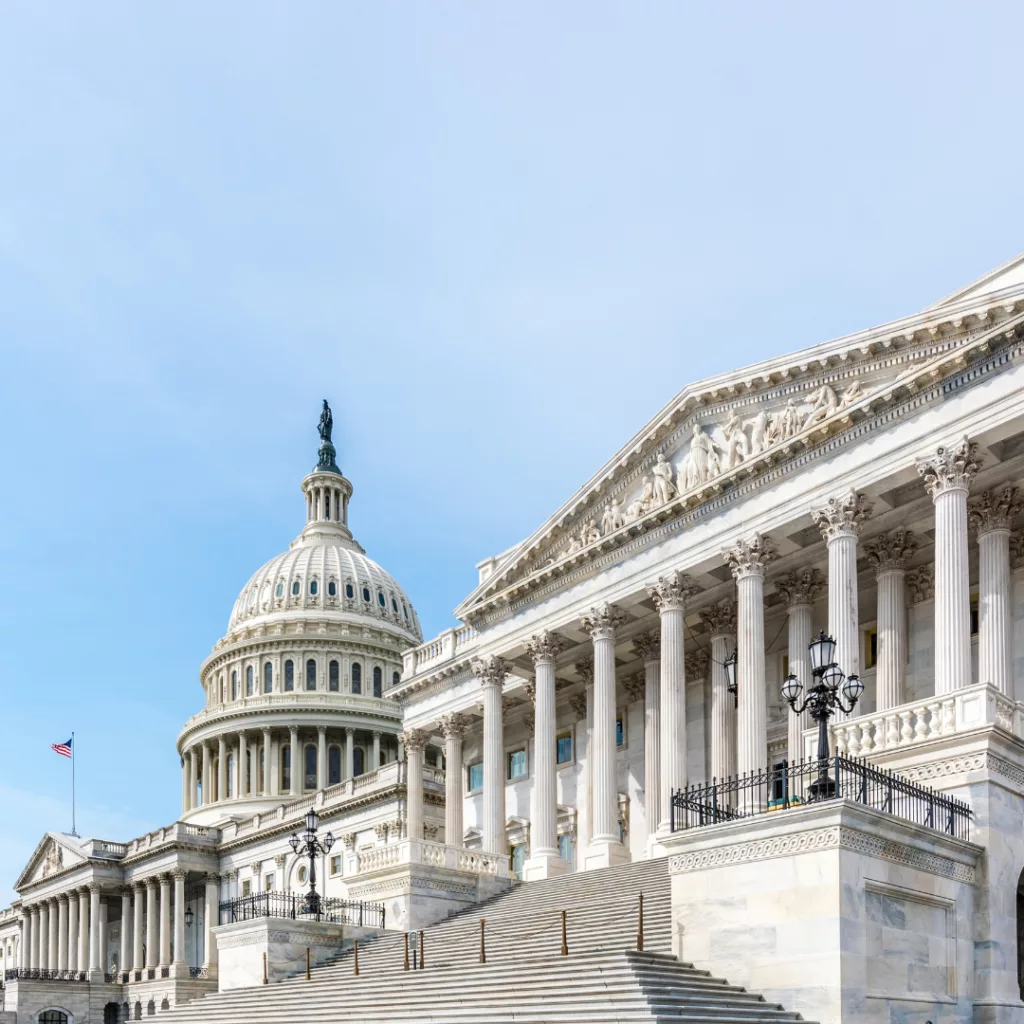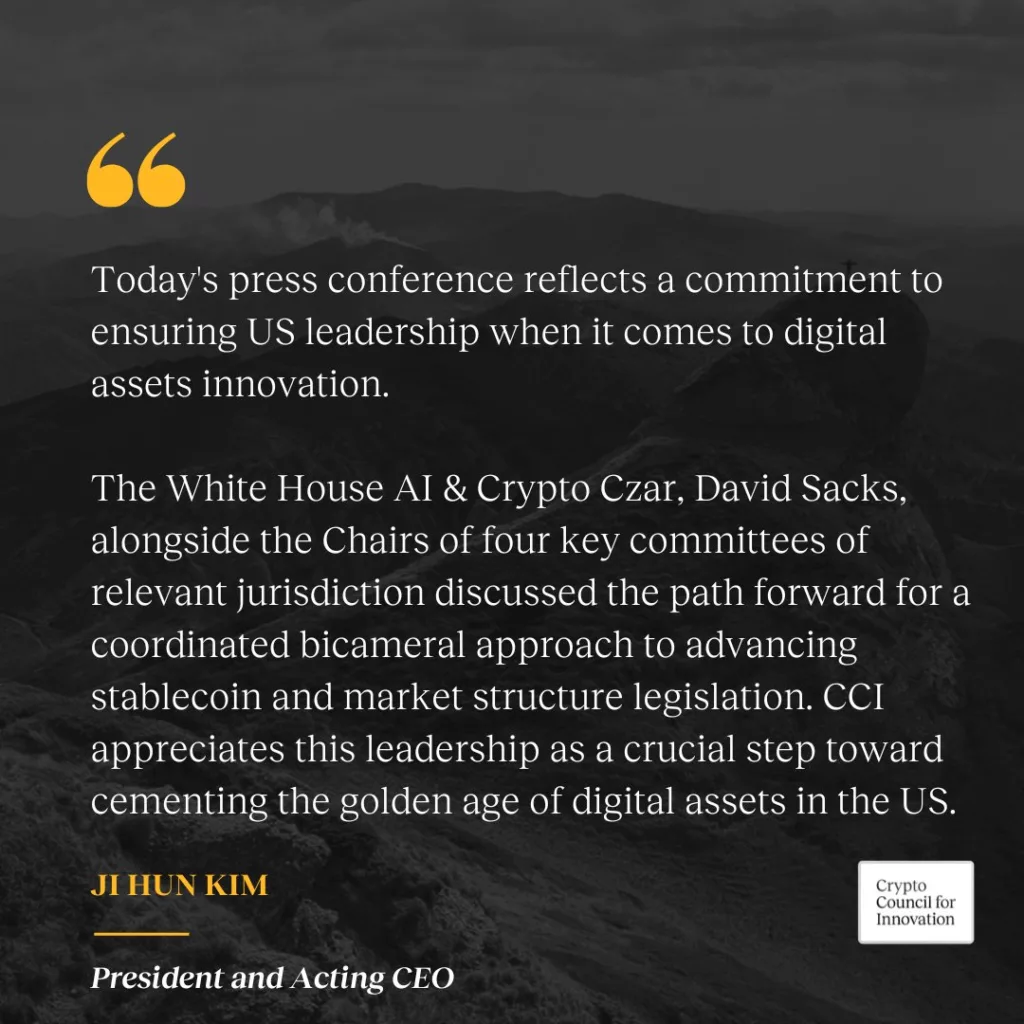
Summary Points
- Crypto policy is in a flurry of activity as CCI highlights key congressional hearings and regulatory developments impacting U.S. financial policy this month.
- From crypto – related stablecoin legislation to the restructuring of the SEC’s crypto enforcement unit, key crypto policy shifts signal a new approach to balancing financial oversight with innovation.
- This blog is part of a series of 2025 U.S. crypto policy blogs to help the sector keep track of the rapidly changing regulatory landscape.
February has been a pivotal month for crypto policy , with lawmakers and regulators making key moves on digital assets, banking regulations, and financial oversight. From congressional hearings on debanking and small business lending to new stablecoin legislation and shifts in the SEC’s enforcement strategy, these developments are notable for the industry. CCI provides a concise overview of the latest crypto policy actions and what they mean for the future.
Digital Assets Press Conference – Feb. 4
White House Crypto & AI Czar David Sacks, alongside Chairs of House Financial Services, House Agriculture, Senate Agriculture, and Senate Banking Committees, held a press conference on digital assets. The discussion centered on advancing crypto policy through a bicameral working group prioritizing stablecoin and market structure legislation.
Lawmakers confirmed that the FIT21 bill will serve as the starting point for market structure legislation, while new stablecoin regulations will be based on a proposal introduced by Sen. Bill Hagerty. Senate Banking Committee Chairman Tim Scott emphasized his intent to advance crypto and stablecoin legislation within the first 100 days, citing bipartisan collaboration. House Financial Services Committee Chairman French Hill echoed this commitment, stating that both market structure and stablecoin regulations will move forward in parallel on a bipartisan basis.
David Sacks noted that an early focus will be assessing the feasibility of a Bitcoin Reserve, though these discussions remain in preliminary stages as key members of the Presidential Working Group on Digital Assets await confirmation. Statement from CCI President and Acting CEO, Ji Kim on X.

Hagerty Introduces the GENIUS Act – Feb. 4
Senator Bill Hagerty introduced the Guiding and Establishing National Innovation for U.S. Stablecoins (GENIUS) Act to create a clear regulatory framework for stablecoins. The bill, cosponsored by Chair Tim Scott and Senators Kirsten Gillibrand and Cynthia Lummis, builds on prior regulatory discussions and aims to strengthen the U.S. dollar’s role in digital finance.
The legislation proposes that stablecoin issuers with over $10 billion in market capitalization comply with Federal Reserve regulations, while smaller issuers would have the option be regulated at the state level. It also establishes licensing procedures, reserve requirements, and compliance measures to prevent financial misconduct. The bill seeks to promote innovation while ensuring consumer protection and financial stability.
SEC Scales Back Crypto Enforcement Unit – Feb. 4
The U.S. Securities and Exchange Commission is reducing the size of its crypto enforcement division, reallocating staff to other areas within the agency. The SEC’s enforcement team dedicated to crypto had grown significantly under former Chair Gary Gensler, leading to more than 100 enforcement actions against crypto firms. With the agency now shifting its stance, some staff members from the unit have been reassigned, and key leadership roles have been adjusted. The changes reflect a broader effort to reconsider regulatory priorities and ensure that crypto policies align with market developments.
Acting SEC Chair Mark Uyeda introduced a task force to reassess the agency’s regulatory approach to digital assets. Led by Commissioner Hester Peirce, the task force aims to develop a framework that encourages innovation while maintaining investor protections. As part of this shift, the SEC will review ongoing litigation against crypto firms, determine the best path forward for regulatory clarity, and coordinate efforts with other financial agencies to establish consistent policies.
SEC’s Crypto Task Force Prioritizes Regulatory Clarity – Feb. 4
SEC Commissioner Hester Peirce announced that the agency’s newly established Crypto Task Force will focus on providing long-awaited regulatory clarity for the crypto industry. The task force aims to address key concerns such as defining when a crypto is classified as a security versus a commodity, improving the registration process for crypto firms, and determining the extent of the SEC’s jurisdiction over digital assets.
This initiative follows the departure of former SEC Chair Gary Gensler, whose enforcement-driven approach to crypto regulation faced criticism. Peirce emphasized that undoing past regulatory uncertainties will take time, particularly as many ongoing enforcement cases and rule proposals remain unresolved. The task force has already taken its first step by reversing a controversial policy that restricted financial institutions from engaging with crypto firms.
HFSC Hearing on Community Banking – Feb. 5
The House Financial Services Committee held a hearing called “Make Community Banking Great Again” to discuss the challenges and opportunities facing community banks, focusing on regulatory concerns, small business lending, and FinTech partnerships.
A major point of contention was the CFPB’s Section 1071 rule, which requires financial institutions to collect and report data on small business lending. Republicans, led by Rep. Andy Barr and Chair French Hill, argued that the rule imposes high compliance costs, potentially pushing small business lending away from community banks to larger institutions or online lenders. Witnesses from community banks supported this concern, stating that the rule’s financial burden could limit their ability to provide loans.
The hearing also addressed the importance of partnerships between community banks and FinTech firms. Lawmakers noted that while these collaborations drive innovation, unclear regulatory guidance creates roadblocks. Witnesses highlighted the need for better coordination between federal and state regulators to streamline FinTech partnerships. Overall, the hearing emphasized the ongoing debate over how best to support community banks while balancing regulatory oversight and innovation.
Senate Banking Committee Hearing on Debanking – Feb. 5
The Senate Banking Committee recently examined the growing concerns over debanking in a hearing called “Investigating the Real Impacts of Debanking in America.” Chairman Tim Scott highlighted issues with regulatory resistance to crypto-related banking activities, while Ranking Member Elizabeth Warren pointed to existing CFPB rules addressing unfair debanking practices and the need for additional anti-money laundering guidance. She said that consumers shouldn’t be arbitrarily denied access to banking services based on their beliefs or other illegitimate reasons.
Lawmakers continued to debate whether debanking decisions stem from regulatory pressure or individual bank policies. Some witnesses argued that banks, fearing regulatory scrutiny, limit services based on reputational risk, while others claimed executive decisions play a larger role. Senators expressed concerns that overregulation has led to excessive reliance on reputational risk, forcing banks to cut off certain customers.
Senator Tillis said that he views overregulation as a factor in debanking people, noting that there is a lot of regulator-initiated debanking happening with the concept of reputational risk. Senator Ricketts inquired whether, during Operation Chokepoint 1.0 and 2.0, regulators exceeded their authority by focusing on vague metrics and reputational risk instead of safety and soundness. However, Democrat Senator Reed said that reputational risk is often the justification for the actions and rules of federal banking regulators. Ultimately, Republicans emphasized the unintended consequences of regulatory overreach, while Democrats focused on existing safeguards against financial discrimination.
Hill and Steil Propose Stablecoin Regulatory Framework – Feb. 6
House Financial Services Committee Chairman French Hill and Digital Assets Subcommittee Chairman Bryan Steil have introduced a discussion draft outlining a proposed regulatory framework for stablecoin issuance in the U.S. The draft bill “To Provide for the Regulation of Payment Stablecoins, and for Other Purposes” aims to provide legal clarity for dollar-denominated stablecoins by establishing both federal and state pathways for issuers.
The proposal builds on previous legislative efforts, including the Clarity for Payment Stablecoins Act, and offers new provisions to grant the OCC oversight of federally qualified nonbank stablecoin issuers. This marks a shift from previous proposals, which positioned the Federal Reserve as the primary regulator. Lawmakers said that the framework is designed to maintain U.S. dollar dominance and protect consumers. The proposal is expected to undergo further refinement based on industry and stakeholder feedback before moving forward in the legislative process.
CFTC CEO Forum – Feb 7
The CFTC announced it will hold a CEO Forum of industry-leading firms to discuss the launch of the CFTC’s digital asset markets pilot program for tokenized non-cash collateral such as stablecoins. Participants will include Circle, Coinbase, Crypto.com, MoonPay and Ripple. Further information on the CEO Forum will be released once details are finalized.
Acting Chairman Pham said, “The CFTC is committed to responsible innovation. I look forward to engaging with market participants to deliver on the Trump Administration’s promise of ensuring that America leads the way on economic opportunity.”
Acting Chairman Pham has previously proposed a CFTC pilot program as a U.S. regulatory sandbox to provide regulatory clarity for digital asset markets and ensure that robust guardrails are in place. The CFTC has had success with pilot programs dating back to the 1990s.
“A Golden Age of Digital Assets” HSFC Hearing – Feb. 11
The U.S. House of Representatives subcommittee on digital assets held a hearing titled “A Golden Age of Digital Assets” to discuss the future of crypto regulation. Industry leaders and experts testified, urging Congress to establish clear legal standards for digital asset businesses. Among the witnesses was Ji Kim, CEO & Acting President of CCI, Jonathan Jachym, Kraken’s global head of policy, and Timothy Massad, former CFTC chairman.
The hearing underscored the growing momentum for crypto regulation in Washington, with industry leaders advocating for clear legal frameworks to ensure the U.S. remains competitive in the global digital asset market. Kim reinforced this urgency in his testimony, outlining key legislative priorities for Congress to consider.
In his testimony, Kim outlined three key priorities: first, passing market structure legislation to clarify when digital assets are commodities or securities and to grant the CFTC authority to regulate spot markets for digital commodities; second, establishing a comprehensive framework for stablecoin regulation that integrates effective state-based models while strengthening the role of U.S. dollar-backed stablecoins in global finance; and third, supporting the development of decentralized finance and self-custody solutions, ensuring individuals can securely manage their own digital assets. He stressed that proactive legislation is the best path to fostering innovation, protecting consumers, and maintaining U.S. leadership in the digital economy.

























